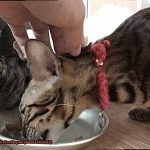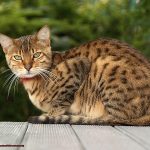Maine Coon kittens are like balls of fluff and energy that can melt anyone’s heart. As a pet parent, you want to give them the best start in life by providing them with the right nutrition for healthy growth and development. But when it comes to figuring out how much food to feed your Maine Coon kitten, it can be overwhelming, especially if you’re a first-time cat owner.
Feeding your Maine Coon kitten is not a one-size-fits-all approach. Their age, weight, activity level, and health condition can all affect their nutritional needs. These fluffy felines are known for their large size and robustness, which means they require a diet rich in nutrients to support their growth.
As a responsible cat parent, you don’t want to overfeed your kitten and risk obesity or underfeed them and compromise their growth and energy levels. It’s all about finding the right balance. Maine Coon kittens have different nutritional requirements compared to adult cats, so it’s crucial to pay close attention to their diet from an early age.
In this article, we’ll explore the essential factors you need to consider when determining how much food to feed your Maine Coon kitten. We’ll also share some of the best feeding practices that will help ensure your kitten gets the proper nutrition they need for optimal health as they grow into majestic adult cats. So let’s get started.
Nutritional Needs of Maine Coon Kittens
Here, we’ll explore the nutritional needs of Maine Coon kittens and how to keep them fit and healthy.
Protein: Building Strong Muscles, Bones, and Tissues
Protein is an essential nutrient for Maine Coon kittens as it helps build strong muscles, bones, and tissues. A protein-rich diet with at least 30% of their food containing chicken, turkey, or fish is ideal. These meats contain essential amino acids that are crucial for their growth and development.
Fat: Energy and Healthy Skin
Fat provides the energy needed by Maine Coon kittens to support their active lifestyle and healthy skin. A diet with at least 20% fat is recommended, with healthy fats such as omega-3 fatty acids from fish oil being the ideal source. These fats are necessary for brain development and reducing inflammation.
Calories: Meeting Your Kitten’s Energy Demands
Maine Coon kittens require more calories than adult cats because of their rapid growth and development. Feeding them multiple small meals throughout the day is recommended. It’s best to feed them around 3-4 small meals per day until they reach six months of age.
Feeding Guidelines: Portion Control is Key
Overfeeding your Maine Coon kitten can lead to obesity and health issues in the future. Follow the feeding guidelines on the food packaging as a starting point, but be mindful that every kitten is different and may require more or less food depending on their individual needs. Regularly monitor your kitten’s weight and adjust their food intake accordingly.
Water: Keeping Your Kitten Hydrated
Keeping your Maine Coon kitten hydrated is vital for their health, especially since dehydration can lead to kidney problems. Ensure they have access to fresh water at all times, and clean their water bowl daily to prevent bacterial growth.
Choosing the Right Food for Your Maine Coon Kitten
These fast-growing kittens require a diet rich in nutrients to support their development, making it crucial to select a high-quality, protein-rich kitten formula.
When searching for the perfect formula, prioritize finding one that lists a high-quality protein source as the first ingredient. Chicken, turkey, and fish are all excellent options that will provide your kitten with the necessary nutrients. Avoid formulas that contain by-products or fillers, as these ingredients do not offer the same nutritional value as high-quality proteins.
The brand of food you choose is also essential. Look for reputable brands that have been around for a while and have positive reviews. Avoid brands that have had recent recalls or negative feedback from customers as they can be risky for your kitten’s health.
When introducing a new food to your Maine Coon kitten, take it slow. Gradually introduce the new formula over a few days to avoid any digestive issues. A mixture of small amounts of the new food with their current food is an effective way to introduce the new formula.
Providing fresh water at all times is critical for Maine Coons as they are prone to urinary tract issues. Encouraging hydration is essential to keep them healthy.
How Much to Feed Your Maine Coon Kitten
These large cats can weigh up to 18 pounds or more, so it’s important to feed them the right amount of food to ensure they grow up healthy and strong.
To start, make sure you’re feeding your Maine Coon kitten a high-quality kitten food that is specifically designed for their nutritional needs. Look for a reputable brand with a high-quality protein source listed as the first ingredient and avoid by-products or fillers that won’t provide the necessary nutrients.
When it comes to determining how much to feed your kitten, age, weight, and activity level should be taken into consideration. A general rule of thumb is to feed your Maine Coon kitten about 3-4 small meals a day until they are six months old. After that, you can decrease the number of meals to 2-3 per day.
While feeding charts provided by manufacturers can be helpful, it’s important to remember that these are only guidelines. Monitor your kitten’s weight and adjust their food intake accordingly to prevent overfeeding, which can lead to obesity and health problems later in life. On the other hand, underfeeding can stunt their growth and development.
Moderate treats are also okay but make sure these treats are specifically designed for kittens and do not exceed 10% of their daily caloric intake.
Monitoring Your Maine Coon Kitten’s Weight
To ensure that your kitten is developing correctly, monitoring their weight and body condition score (BCS) is crucial. Let’s explore why this is so important and how you can do it effectively.
Maine Coon kittens are known for their rapid growth rate, and it’s essential to keep an eye on their weight to ensure they’re growing healthily. Overfeeding or underfeeding can lead to various health problems, so getting it right is vital. That’s why weighing your kitten regularly is one of the most important things you can do. We recommend weighing them weekly until they reach six months of age, and then switching to monthly weigh-ins.
To get an accurate reading of your kitten’s weight, use a digital scale that can measure small increments. Keep a record of the weights so you can track their progress over time. If you notice any sudden weight gain or loss, consult with your veterinarian immediately.
In addition to monitoring your kitten’s weight, it’s also crucial to assess their body condition score (BCS). BCS is a system used to evaluate a cat’s body composition based on their muscle mass and body fat. A healthy Maine Coon kitten should have a BCS between 3-5, with 3 being underweight and 5 being overweight. You can consult with your veterinarian to learn how to assess your kitten’s BCS accurately.
Regularly monitoring your kitten’s weight and BCS will help you identify any potential health issues early on and allow for timely intervention. If you’re concerned about your kitten’s growth rate or weight, don’t hesitate to consult with your veterinarian. They can help identify any underlying health issues that may be causing the changes in weight and provide proper treatment.
Providing Fresh Water for Your Maine Coon Kitten
One of the most important ways to do this is by providing them with fresh water at all times. Water is just as crucial as food for your kitten’s well-being, so it’s essential to understand how much they need and how to provide it.
To begin, it’s important to note that cats should drink about one ounce of water per pound of body weight per day. So, if your Maine Coon kitten weighs five pounds, they should drink roughly five ounces of water daily. Keep an eye on their water intake to ensure they stay hydrated.
To provide fresh water effectively, use a wide and shallow bowl. This type of bowl makes it easier for your kitten to drink without getting their whiskers wet. Also, consider investing in a cat fountain which can encourage your kitten to drink more. Some cats prefer running water, and the sound of the fountain may be more enticing than a still bowl of water.
It’s also important to note that some kittens may not drink enough water, especially if they eat exclusively dry food. In this case, adding wet food to their diet can help. Wet food contains more moisture than dry food and helps keep your kitten hydrated. Additionally, experiment with different water temperatures to see what your kitten prefers. Some cats prefer room temperature or slightly warmed water.
Also Read: How to Schedule Maine Coon Feeding?
Conclusion
In conclusion, feeding your Maine Coon kitten requires a personalized approach. Age, weight, activity level, and health condition all play a role in determining their nutritional needs. Providing them with the right balance of nutrients is essential for healthy growth and development.
To ensure your Maine Coon kitten receives adequate nutrition, consider their protein intake for building strong muscles, bones, and tissues. Fat provides energy for their active lifestyle while promoting healthy skin. Portion control is key to avoiding obesity or underfeeding while meeting their energy demands.
Choosing high-quality food with protein listed as the first ingredient is crucial. Avoid fillers or by-products that won’t provide the necessary nutrients. Monitoring your kitten’s weight and body condition score (BCS) can help identify potential health issues early on.
Remember to provide fresh water at all times using a wide and shallow bowl or cat fountain to encourage hydration. By following these feeding practices, you can ensure your Maine Coon kitten grows into a majestic adult cat with optimal health.
Consulting with your veterinarian is always recommended if you’re concerned about your kitten’s growth rate or weight.







